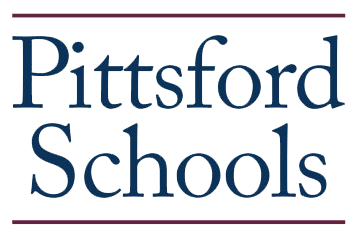eLearning Course
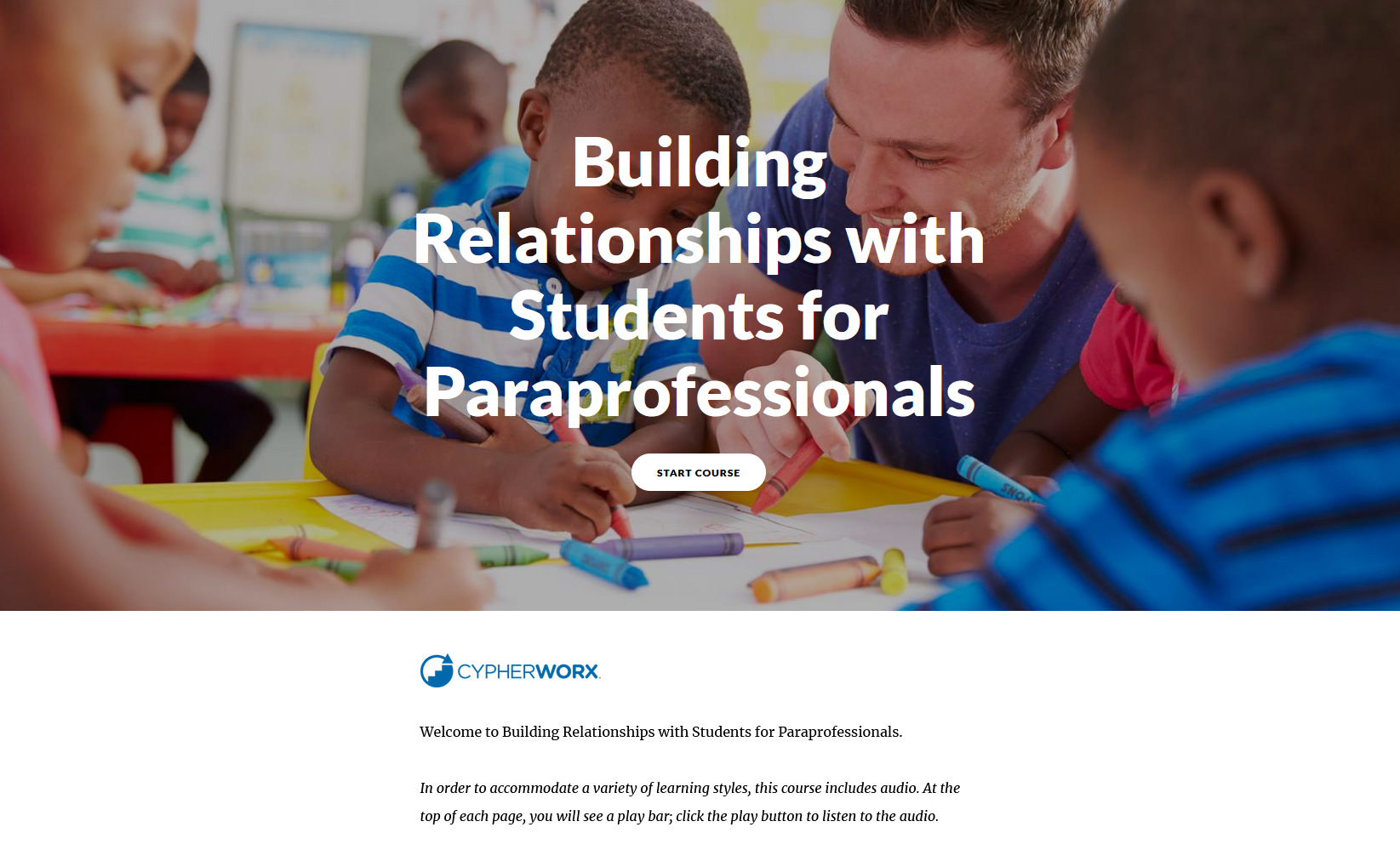
Course Goals
- To understand the importance of taking the time to build positive relationships with students.
- To explore tips, techniques, and activities to help paraprofessionals build relationships with students.
Learning Objectives
- Identify characteristics and attributes that help paraprofessionals build relationships with students.
- Reflect on personal characteristics and attributes as a paraprofessional.
- Identify the elements of a safe and supportive classroom.
- Describe the importance of self-reflection in building relationships with students.
- Identify techniques and activities to build relationships with students.
Live Training Course

Participants attended a one-hour live training course led by the Director of the Pittsford CSD Teacher Center utilizing generally accepted Constructivist and ARCS Model learning theory approaches.
During the one-hour session participants worked in small groups, and as a whole, to develop personalized plans for implementing learning objectives into actionable classroom strategies. Three worksheets were provided to participants to assist them with reflections and action planning.
Live Training Course Handouts
Participants completed three handouts as part of the training. The handouts assisted them in developing plans to implement long-term strategies for improving relationships with students during the eLearning Module, live training, and closure activity.
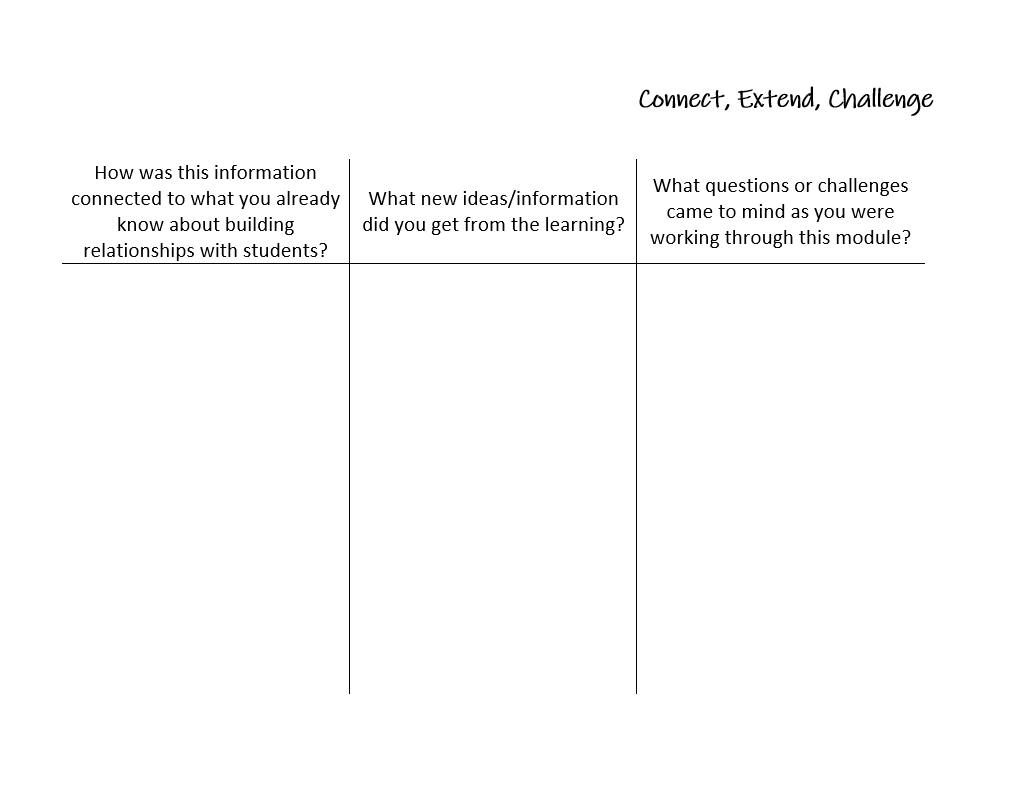
Handout 1 – Used by Participants During Live Training

Handout 1 – Closure Activity
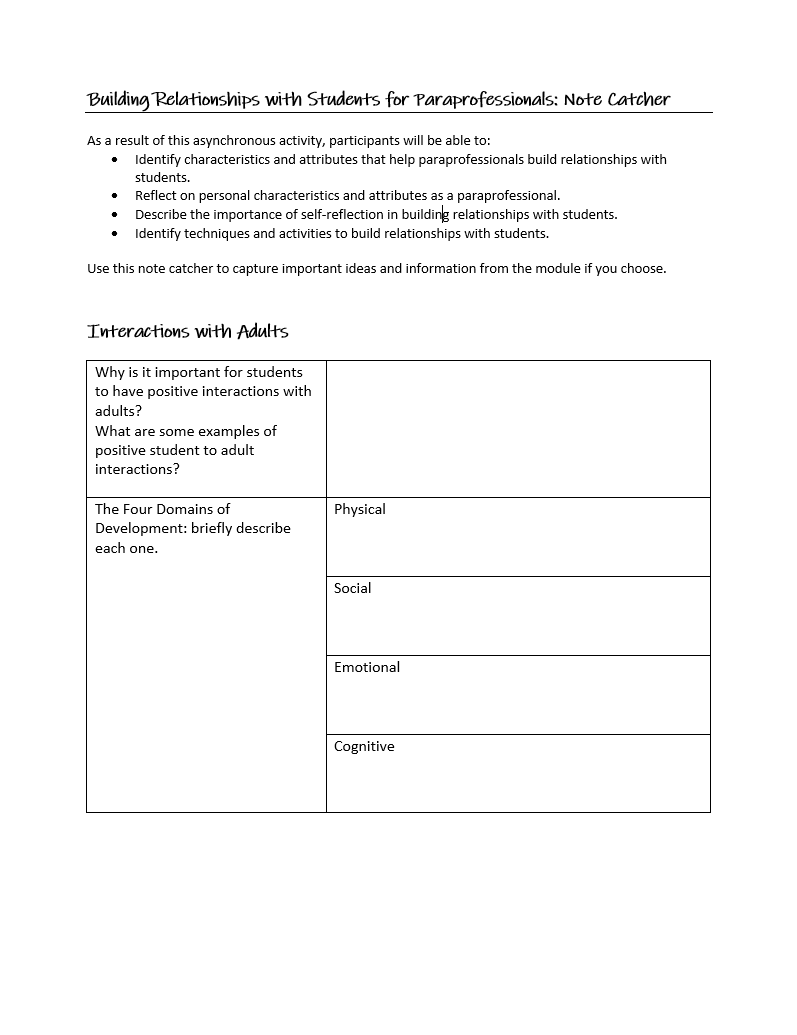
Handout 3 – Used by Participants During eLearning Module
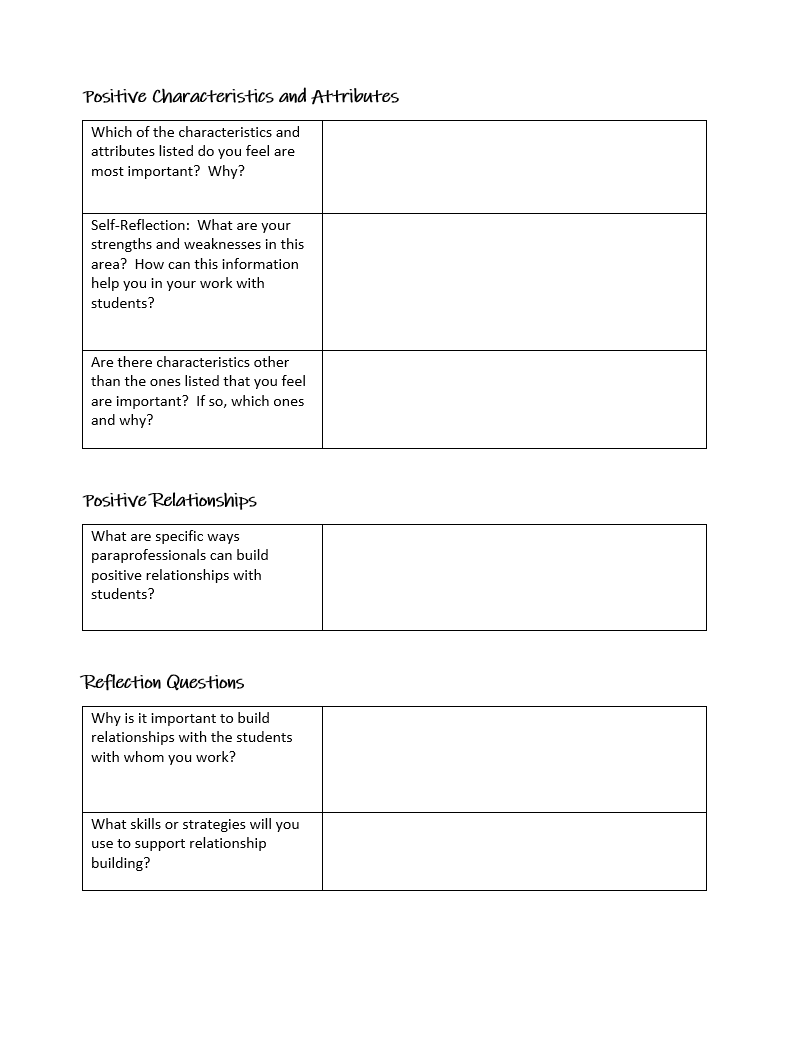
Handout 3 – Used by Participants During eLearning Module
Data Collection
Data was collected for the paraprofessional eLearning course. The involved data included:
Pre- and posttest scores
Based on answers to test items aligned with the course’s objectives. The Objective Measures section of this document summarizes test results.
Post-survey responses
From a survey conducted with participants following completion of the final course. The Participant Beliefs section of this document summarizes survey results.
Participant Demographics
Information describing the 21 pilot study participants
Gender
Study Participants (n=21)
National Averages for Field *
Age
Study Participants (n=21)
National Averages for Field *
Education
Study Participants (n=21)
National Averages for Field *
Paraprofessional Experience
Study Participants (n=21)
National Averages for Field *
Computer Skills
Study Participants Self-Rating:
How would you rate your level of computer / technical experience?
(n=21)
Objective Measures
A comparison of pre- and posttest performance to determine growth as a result of instruction.
Pretest to Posttest Comparisons
The course in this pilot includes a pre- and posttest instrument. Aligned with the course objectives, these tests were used to assess participant knowledge prior to, and following completion of, the course. This analysis uses mean scores to analyze differences in pre- and posttest performance.
Pretest to Posttest Gains
Study Participants (n=21)
* 21 people took the pre-test and 19 of those people completed the post-test.
Pretest to Posttest Gains
| Gender | Pre-Test | Post-Test | Change |
|---|---|---|---|
| Female (including transgender women) | 63% | 88% | +25 |
| Prefer not to answer | 71.6% | 94.7% | +23.1 |
| Age | Pre-Test | Post-Test | Change |
|---|---|---|---|
| 30-39 years | 38% | 88% | +50 |
| 40-49 year | 80.7% | 96.6% | +15.9 |
| 50-59 years | 70.7% | 94% | +23.3 |
| 60+ years | 75% | 88% | +13 |
| Education Level | Pre-Test | Post-Test | Change |
|---|---|---|---|
| Some college / technical training | 56.5% | 100% | +43.5 |
| 2-year degree | 63% | 100% | +37 |
| 4-year degree | 75.2% | 92.8% | +17.6 |
| Advanced Degree (Masters or Doctoral) | 73.3% | 94% | +20.7 |
| Professional Experience | Pre-Test | Post-Test | Change |
|---|---|---|---|
| 0-5 years | 74.2% | 94% | +19.8 |
| 6-10 years | 75.2% | 92.8% | +17.6 |
| 11-15 years | 63% | 94% | +31 |
| 16-25 years | 58.7% | 100% | +41.3 |
| Computer Experience | Pre-Test | Post-Test | Change |
|---|---|---|---|
| Intermediate Level | 68.6% | 94% | +25.4 |
| High Level | 70.2% | 97% | +26.8 |
| Exceptionally Skills | 83.7% | 92% | +8.3 |
Participant Beliefs
A look at participant self-assessment responses following instruction.
Post-Survey Questions
Project participants completed the post survey after they finished the blended course experience. Participants were asked a variety of questions about their understanding of course material, ability to implement learning objectives, and their beliefs in each area of the training experience.
What are your professional goals for using the information you learned in the modules and in-person training session?
4.5 stars
I would rate the overall training experience, including the online module and in-person training session
I feel competent and confident implementing what I learned from the training.
Would you like more training like this?
Get started today
CypherWorx Efficacy Studies follow process and data collection policies created by James Marshall, Ph.D., Co-Director & Professor Educational Leadership, San Diego State University. Dr. Marshall’s scholarship, teaching, and consulting combine our understanding of human performance and organization development to assess strengths, devise strategy, and improve even the most vexing of challenges.
Learn more about Dr. Marshall’s work at San Diego State, or contact Dr. Marshall for consulting projects and how he can help your organization.

